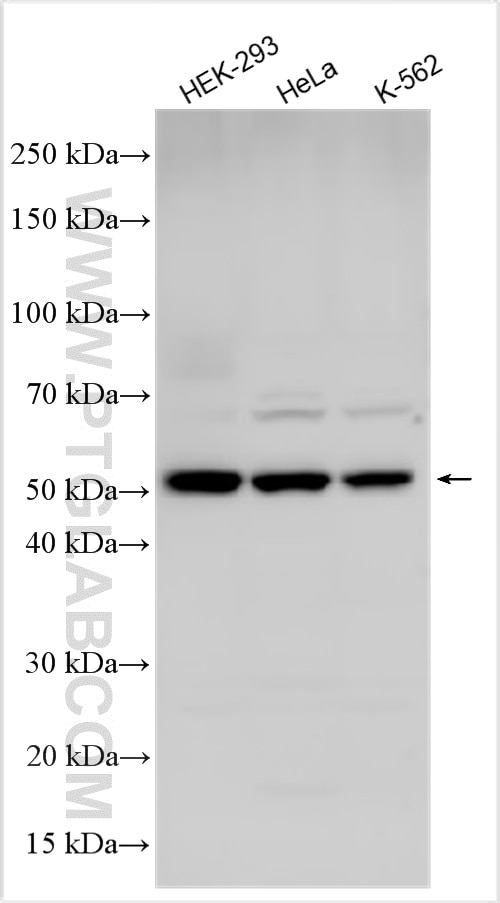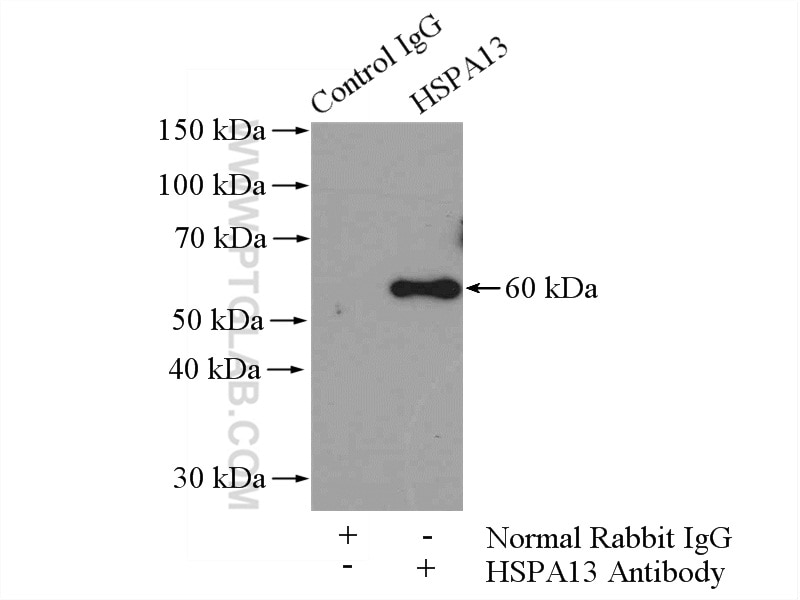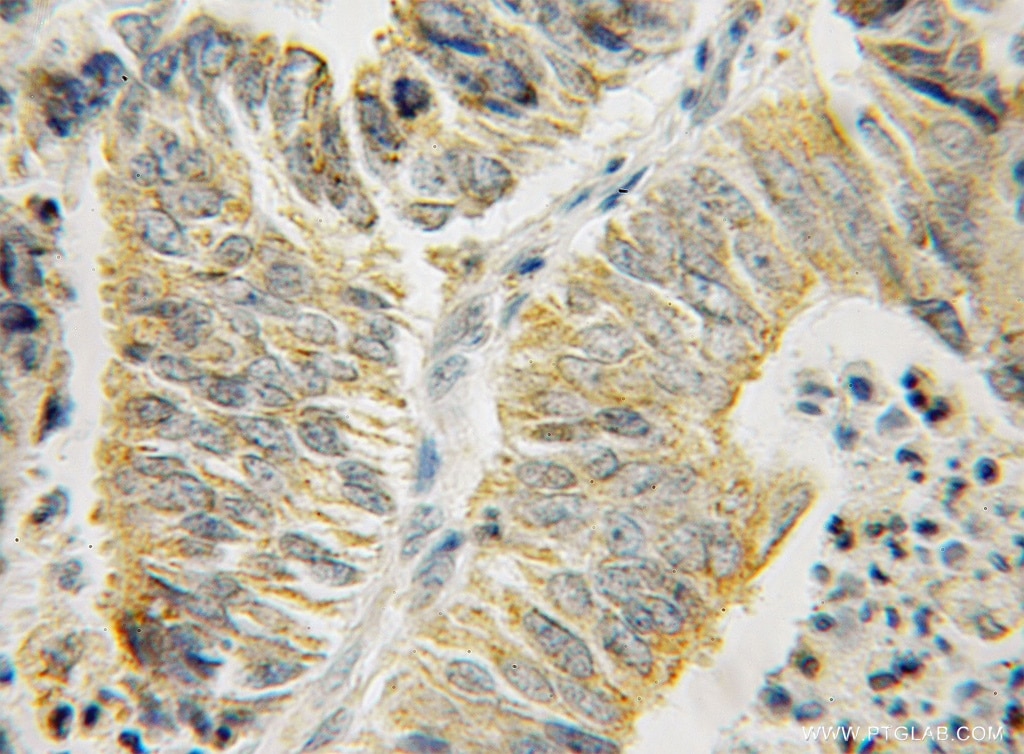- Featured Product
- KD/KO Validated
HSPA13 Polyklonaler Antikörper
HSPA13 Polyklonal Antikörper für WB, IHC, IP, ELISA
Wirt / Isotyp
Kaninchen / IgG
Getestete Reaktivität
human
Anwendung
WB, IHC, IF, IP, CoIP, ELISA
Konjugation
Unkonjugiert
Kat-Nr. : 12667-2-AP
Synonyme
Geprüfte Anwendungen
| Erfolgreiche Detektion in WB | HEK-293-Zellen, HeLa-Zellen, K-562-Zellen |
| Erfolgreiche IP | HeLa-Zellen |
| Erfolgreiche Detektion in IHC | humanes Endometriumkarzinomgewebe Hinweis: Antigendemaskierung mit TE-Puffer pH 9,0 empfohlen. (*) Wahlweise kann die Antigendemaskierung auch mit Citratpuffer pH 6,0 erfolgen. |
Empfohlene Verdünnung
| Anwendung | Verdünnung |
|---|---|
| Western Blot (WB) | WB : 1:2000-1:12000 |
| Immunpräzipitation (IP) | IP : 0.5-4.0 ug for 1.0-3.0 mg of total protein lysate |
| Immunhistochemie (IHC) | IHC : 1:20-1:200 |
| It is recommended that this reagent should be titrated in each testing system to obtain optimal results. | |
| Sample-dependent, check data in validation data gallery | |
Veröffentlichte Anwendungen
| KD/KO | See 3 publications below |
| WB | See 9 publications below |
| IHC | See 2 publications below |
| IF | See 1 publications below |
| CoIP | See 2 publications below |
Produktinformation
12667-2-AP bindet in WB, IHC, IF, IP, CoIP, ELISA HSPA13 und zeigt Reaktivität mit human
| Getestete Reaktivität | human |
| In Publikationen genannte Reaktivität | human |
| Wirt / Isotyp | Kaninchen / IgG |
| Klonalität | Polyklonal |
| Typ | Antikörper |
| Immunogen | HSPA13 fusion protein Ag3349 |
| Vollständiger Name | heat shock protein 70kDa family, member 13 |
| Berechnetes Molekulargewicht | 471 aa, 52 kDa |
| Beobachtetes Molekulargewicht | 52 kDa |
| GenBank-Zugangsnummer | BC036370 |
| Gene symbol | HSPA13 |
| Gene ID (NCBI) | 6782 |
| Konjugation | Unkonjugiert |
| Form | Liquid |
| Reinigungsmethode | Antigen-Affinitätsreinigung |
| Lagerungspuffer | PBS with 0.02% sodium azide and 50% glycerol |
| Lagerungsbedingungen | Bei -20°C lagern. Nach dem Versand ein Jahr lang stabil Aliquotieren ist bei -20oC Lagerung nicht notwendig. 20ul Größen enthalten 0,1% BSA. |
Hintergrundinformationen
HSPA13 (Heat shock 70 kDa protein 13), also known as STCH (the stress 70 protein chaperone), is a member of the Hsp70 family of ATPase "stress" or "heat shock" proteins. Human STCH encodes a 60 kDa protein that is highly enriched in the ER. Recently it has been reported that overexpression of the HSPA13 gene reduces prion disease incubation time in mice.
Protokolle
| PRODUKTSPEZIFISCHE PROTOKOLLE | |
|---|---|
| WB protocol for HSPA13 antibody 12667-2-AP | Protokoll herunterladen |
| IHC protocol for HSPA13 antibody 12667-2-AP | Protokoll herunterladenl |
| IP protocol for HSPA13 antibody 12667-2-AP | Protokoll herunterladen |
| STANDARD-PROTOKOLLE | |
|---|---|
| Klicken Sie hier, um unsere Standardprotokolle anzuzeigen |
Publikationen
| Species | Application | Title |
|---|---|---|
Sci Adv HSPA13 facilitates NF-κB-mediated transcription and attenuates cell death responses in TNFα signaling.
| ||
Proc Natl Acad Sci U S A Overexpression of the Hspa13 (Stch) gene reduces prion disease incubation time in mice. | ||
Endocrinology Reassessment of the Proteomic Composition and Function of Extracellular Vesicles in the Seminal Plasma. | ||
Proteome Sci PRM-based quantitative proteomics analysis of altered HSP abundance in villi and decidua of patients with early missed abortion | ||
Cell Death Discov Heat shock protein HSPA13 promotes hepatocellular carcinoma progression by stabilizing TANK
| ||
Endocrinology Human seminal extracellular vesicles enhance endometrial receptivity through leukemia inhibitory factor |




